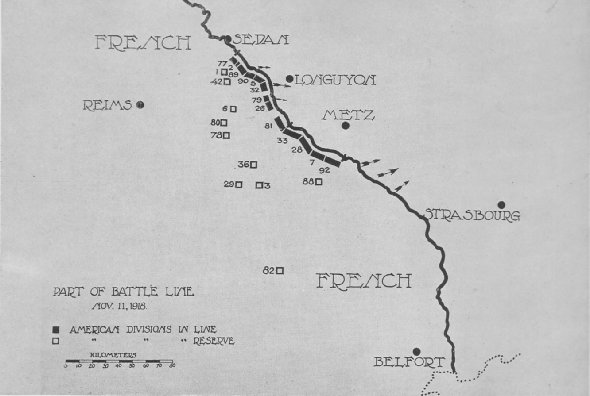
Click to enlarge.
 Click to enlarge. |
| Metz, the citadel, known as "La pucelle," the world's strongest fortress, was our next objective. Its capture would have meant a terrific sacrifice. The Armistice coming when it did was fortunate for America. |
German Cries "Kamerad"
On November 5 President Wilson notified the German government that it might apply to Marshal Foch for an armistice, and on the next day Germany appointed Mathias Erzberger to head a delegation for this purpose. On November 8 the Allied commander-in-chief, handed his terms, which had been prepared in advance, to the Germans, making them subject to acceptance or rejection without change within three days. According to these terms, Germany must evacuate France, Luxembourg, Belgium, and Alsace-Lorraine within fourteen days, and all territory on the left bank of the Rhine within one month. All of this territory was to be taken over by the Allied armies, which were also to occupy the bridgeheads of the Rhine at Cologne, Coblenz, and Mainz to a depth of thirty kilometers on the right bank. On this bank a neutral zone ten kilometers wide was to extend from Switzerland to the Dutch frontier.
(See map Pershing report, section one, page 41). (Use browser's back button to return here.)All German forces must be withdrawn from East Africa, Turkey, Rumania, and Russia, and Germany must renounce the treaties of Brest-Litovsk and Bucharest. All cash taken from the National Bank of Belgium and all gold taken from Russia and Rumania must be returned. She must surrender the railways and all stores of coal and iron in Alsace-Lorraine. Within two weeks she must hand over to the Allies 5,000 locomotives, 150,000 railroad cars, 50,000 wagons, and 10,000 motor lorries in good working order. She must surrender all submarines, fifty destroyers, ten battle ships, six battle cruisers and eight light cruisers, and must disarm the rest, together with all naval aircraft. There must be an immediate repatriation, without reciprocity, of all Allied prisoners. The existing Allied blockade of Germany was to continue without change, and all German ships found at sea were to be liable to capture.
Foch's terms were not peace terms; they were merely designed to make it impossible for Germany successfully to resume the war, once she had carried them out. It is known that General Bliss, America's representative on The Supreme War Council, remonstrated with Foch that the terms imposed on Germany were too severe. Foch was adamant. A wise old owl was Tasker Bliss. The German delegates were in a difficult position. Bavaria had proclaimed a republic, Ludendorff had been dismissed from his post in the army, mutiny had begun in the navy. During the three-day period for consideration, the empire collapsed, a Socialist ministry proclaimed the German Republic, and the Kaiser fled from Spa to Holland. Germany was in chaos; there was little to do but accept the Allied terms. In the Forest of Compiegne the German delegation signed the Armistice at five o'clock on the morning of November 11, and the news was flashed to an expectant world—but not to the boys in the line—that fighting would cease that day at 11 A.M.